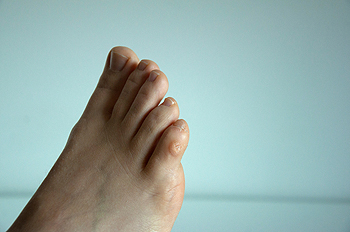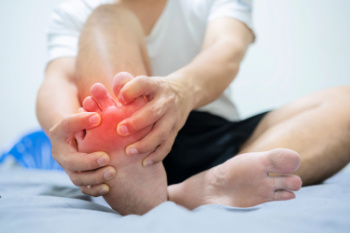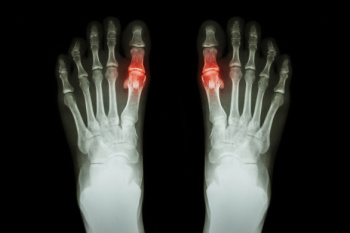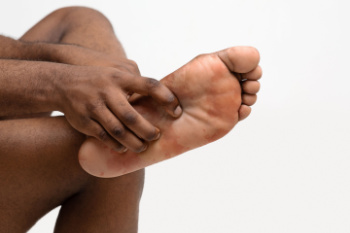Blog

Corns are thickened areas of skin that develop when repeated pressure or friction causes the body to protect itself. They often form on toes or areas that rub against footwear or other toes, and they may feel painful when walking. Hard corns usually appear on the tops or sides of toes, while soft corns tend to develop between toes where moisture is present. Although corns may seem minor, they can worsen over time and interfere with gait. A podiatrist can identify the underlying cause, such as foot structure, abnormal pressure points, or improper footwear, and determine the exact type of corn present. Treatment of corns includes safe removal of thickened skin, pressure redistribution, and recommendations to reduce recurring friction. Addressing corns early can reduce ongoing discomfort. For help with safely managing a painful corn, it is suggested that you make an appointment with a podiatrist.
If you have any concerns regarding your feet and ankles, contact one of our podiatrists of South Jersey Foot & Ankle Institute. Our doctors will treat your foot and ankle needs.
Corns: What Are They? and How Do You Get Rid of Them?
Corns can be described as areas of the skin that have thickened to the point of becoming painful or irritating. They are often layers and layers of the skin that have become dry and rough, and are normally smaller than calluses.
Ways to Prevent Corns
There are many ways to get rid of painful corns such as wearing:
- Well-fitting socks
- Comfortable shoes that are not tight around your foot
- Shoes that offer support
Treating Corns
Treatment of corns involves removing the dead skin that has built up in the specific area of the foot. Consult with Our doctors to determine the best treatment option for your case of corns.
If you have any questions, please feel free to contact our office located in Mullica Hill, NJ . We offer the newest diagnostic and treatment technologies for all your foot care needs.

Toe pain caused by capsulitis occurs when the ligament that surrounds a toe joint becomes inflamed due to repeated stress or pressure. This problem most often affects the joint at the base of the second toe, where excessive load on the front of the foot can reduce joint stability. People may notice aching, swelling, stiffness, or pain that increases with walking or prolonged standing. Changes in foot structure, uneven weight distribution, toe length differences, or increased activity can all contribute to capsulitis. If it is not addressed, the affected toe may gradually shift position, leading to persistent discomfort and difficulty wearing shoes. A podiatrist can assess toe alignment, joint function, and walking mechanics to confirm the cause of pain. Treatment options aim to reduce strain on the joint and support proper toe positioning. If you are experiencing such toe pain, it is suggested that you make an appointment with a podiatrist for an exam, diagnosis, and treatment.
Toe pain can disrupt your daily activities. If you have any concerns, contact one of our podiatrists of South Jersey Foot & Ankle Institute. Our doctors can provide the care you need to keep you pain-free and on your feet.
What Causes Toe Pain?
Most severe toe pain is caused due to a sports injury, trauma from dropping something heavy on the toe, or bumping into something rigid. Other problems can develop over time for various reasons.
Toe pain can be caused by one or more ailments. The most common include:
- Trauma
- Sports injury
- Wearing shoes that are too tight
- Arthritis
- Gout
- Corns and calluses
- Hammertoe
- Bunions
- Blisters
- Ingrown toenails
- Sprains
- Fractures (broken bones)
- Dislocations
When to See a Podiatrist
- Severe pain
- Persistent pain that lasts more than a week
- Signs of infection
- Continued swelling
- Pain that prevents walking
Diagnosis
In many cases the cause of toe pain is obvious, but in others, a podiatrist may want to use more advanced methods to determine the problem. These can range from simple visual inspections and sensation tests to X-rays and MRI scans. Prior medical history, family medical history, and any recent physical traumatic events will all be taken into consideration for a proper diagnosis.
Treatment
Treatments for toe pain and injuries vary and may include shoe inserts, padding, taping, medicines, injections, and in some cases, surgery. If you believe that you have broken a toe, please see a podiatrist as soon as possible.
If you have any questions please contact our office located in Mullica Hill, NJ . We offer the newest diagnostic and treatment technologies for all your foot and ankle needs.

Gout is a common and acute form of inflammatory arthritis that often shows up first in the foot, especially the big toe. The toe may look red and shiny, and feel warm, sometimes with tight skin that appears stretched. It often feels like sudden burning pain, throbbing, and extreme tenderness, even to light touch or sheets. Symptoms can arrive quickly and flare at night. Causes include high uric acid levels, kidney issues, and diets high in purines, such as red meat, shellfish, and alcohol. A podiatrist can help from the start by confirming the diagnosis through history, imaging, and laboratory testing when needed. Treatment may begin with pain relief, anti-inflammatory care and footwear advice. It may then move into long-term management, lifestyle education, and coordination with medical providers. Early care can reduce damage and recurrence. If you are dealing with painful gout, it is suggested that you make an appointment with a podiatrist.
Gout is a foot condition that requires certain treatment and care. If you are seeking treatment, contact one of our podiatrists from South Jersey Foot & Ankle Institute. Our doctors will treat your foot and ankle needs.
What Is Gout?
Gout is a type of arthritis caused by a buildup of uric acid in the bloodstream. It often develops in the foot, especially the big toe area, although it can manifest in other parts of the body as well. Gout can make walking and standing very painful and is especially common in diabetics and the obese.
People typically get gout because of a poor diet. Genetic predisposition is also a factor. The children of parents who have had gout frequently have a chance of developing it themselves.
Gout can easily be identified by redness and inflammation of the big toe and the surrounding areas of the foot. Other symptoms include extreme fatigue, joint pain, and running high fevers. Sometimes corticosteroid drugs can be prescribed to treat gout, but the best way to combat this disease is to get more exercise and eat a better diet.
If you have any questions, please feel free to contact our office located in Mullica Hill, NJ . We offer the newest diagnostic and treatment technologies for all your foot care needs.

Heel pain often begins when the thick band of tissue along the bottom of the foot becomes overstressed. This tissue, termed the plantar fascia, supports the arch and helps absorb force with every step. Over time, repeated strain near the heel bone can lead to painful tears called plantar fasciitis, a degenerative condition rather than an inflammatory one. Pain is felt at the bottom or inner side of the heel and is sharp with the first steps after rest, then worsens again after long periods on the feet. Risk factors include flat feet, high arches, limited ankle motion, prolonged standing, running, and shoes with inadequate support, like frequent use of flip-flops. A podiatrist can evaluate foot structure, gait, and ankle flexibility to confirm the diagnosis and guide appropriate care, or, in persistent cases, suggest surgery. For help with foot problems, it is suggested that you consult a podiatrist for an exam and treatment.
Plantar fasciitis can be very painful and inconvenient. If you are experiencing heel pain or symptoms of plantar fasciitis, contact one of our podiatrists from South Jersey Foot & Ankle Institute. Our doctors can provide the care you need to keep you pain-free and on your feet.
What Is Plantar Fasciitis?
Plantar fasciitis is the inflammation of the thick band of tissue that runs along the bottom of your foot, known as the plantar fascia, and causes mild to severe heel pain.
What Causes Plantar Fasciitis?
- Excessive running
- Non-supportive shoes
- Overpronation
- Repeated stretching and tearing of the plantar fascia
How Can It Be Treated?
- Conservative measures – anti-inflammatories, ice packs, stretching exercises, physical therapy, orthotic devices
- Shockwave therapy – sound waves are sent to the affected area to facilitate healing and are usually used for chronic cases of plantar fasciitis
- Surgery – usually only used as a last resort when all else fails. The plantar fascia can be surgically detached from the heel
While very treatable, plantar fasciitis is definitely not something that should be ignored. Especially in severe cases, speaking to your doctor right away is highly recommended to avoid complications and severe heel pain. Your podiatrist can work with you to provide the appropriate treatment options tailored to your condition.
If you have any questions, please feel free to contact our office located in Mullica Hill, NJ . We offer the newest diagnostic and treatment technologies for all your foot care needs.

